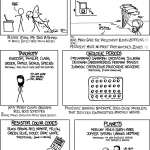Articles in the ‘Advanced’ category Page 37
-
Growing up in Chinese as a foreign adult
Learning Chinese is in many ways like becoming a child again. That has it’s advantages, but it can also be incredibly frustrating at times. As usual, being aware of the problem is the first step towards solving it. Unfortunately, the only way to handle this particular problem is to adopt a healthy attitude towards it.
Read → -
Using memory aids and mnemonics to make Chinese easier
Remember almost anything is a skill that can be learnt. In fact, some of the methods I talk about in this article have been known for thousands of years. Most mnemonic methods use the power of association to enable us to remember things. In this article, I discuss how we can use this to help us learn Chinese much more efficiently than if we rely on conventional methods.
Read → -
Chinese vocabulary in your pocket
Having vocabulary with you so that you can study anywhere isn’t merely a handy trick, it’s essential. You don’t want to waste high quality time at home in front of your computer doing something you might as well do in the super market queue or while waiting for the bus. Study the right things at the right time!
Read → -
Improve your conversations by listening to the listener
Listening to a dialogue, have you ever tried listening to the person who isn’t speaking? Try listening to the listener, it will teach you many small words and sounds that help you communicate.
Read → -
Dealing with tricky vocabulary: Killing leeches
Leeches are words or characters that you keep forgetting and therefore consume much more time than other words or characters. Rather than trying to hammer these words into your brain, a specific strategy is needed to kill the leeches. This article deals with just that, how to handle difficult vocabulary you keep on forgetting.
Read → -
Memorising dictionaries to boost Chinese reading ability
Memorising a dictionary is of course not an optimal way of learning vocabulary, but I do think it’s good to use frequency lists (such as dictionaries listing the most common characters) to plug holes in your foundation and make it stronger.
Read → -
Escaping the convenience trap to learn more Chinese
We like to spend time doing what we’re already good at, which might be a good thing if we’re aiming for excellence in a very narrow field. However, learning a language is not so narrow and requires us ta learn a variety of skills. In this article, I explore the tendency to focus on what we’re already good at and some of it’s negative consequences. I also propose some hands-on tips to escape the convenience trap.
Read → -
Review: Chinese Synonyms Usage Dictionary
This is a review of a very useful synonym dictionary, complete with detailed descriptions and comparisons of commonly confused words. It’s useful both as a dictionary and for studying vocabulary. I recommend the book for anyone from intermediate level and up, but some parts are useful for everyone.
Read → -
Spaced repetition isn’t rote learning
Spaced repetition might on the surface look like it’s rote learning, but I argue that it isn’t. Firstly, spaced repetition isn’t about learning as such. You’re supposed to use smarter methods to learn the words first and then simply review to keep the knowledge fresh. Secondly, spaced repetition won’t degenerate to rote learning if you are alert and avoid cramming of any kind.
Read → -
Goals and motivation for learning Chinese, part 4 – Micro goals
This is the fourth article in my series on goals and motivation. This time the topic is micro goals and how to use them to enhance your studying. In essence, you will need to have goals on many different levels to make sure that you are moving in the right direction. Links to previous articles are presented at the beginning.
Read →







